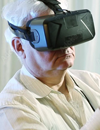

Meet 6 Startups That Could Transform Care

Several things were abundantly clear at the recent AHA Leadership Summit.
First, workforce challenges being what they are, provider organizations must find innovative ways to optimize caregivers’ time. Second, artificial intelligence (AI) and other technologies will need to be harnessed to enhance clinical decision-making, reduce administrative burden and help improve outcomes. And, last, this transformation needs to accelerate.
With this reality as a backdrop, six health care startups shared their approaches to addressing complex challenges in areas like improving access to high-quality mental health, delivering clinical risk intelligence for hospitals and leveraging enterprise time-study data to optimize caregivers’ performance. Here’s a snapshot of each company’s value proposition.
 Altopax
Altopax
This company operates on a simple premise. The clinician shortage and poor reimbursement stop many, if not most, patients in need of mental health care from getting it. And unlike other telehealth solutions, Altopax tackles the scalability problem via group telehealth. The privacy-enhancing platform enables patients to use an avatar to participate in group therapy and uses measurement-based care tools and personalized pathways. The specialty network delivers measurable, scalable care via health psychologists who demonstrate cultural competency and can address specific populations such as the elderly.
| Transformative Potential |
As the field continues to deal with a significant shortage of behavioral health providers, the platform addresses many touch points across the care continuum in such areas as transitional care for post-acute groups, outpatient behavioral health and integrated care (e.g., primary care, oncology, diabetes and depression, and chronic pain).
 Bend Health
Bend Health
Founded by Monika Roots, M.D., a child and adolescent psychiatrist, and her husband Kurt, a data scientist, the company provides services nationally in a collaborative care model that integrates pediatric primary care with behavioral care. Bend Health empowers kids, teens and families with skills to build lifelong resilience. It provides a rapid-support team to perform risk assessment, crisis management and triage. It also offers virtual neuropsychological testing to support diagnoses of disorders, conditions and brain injuries. Mental health coaching also is available along with mental health content to allow self-study between sessions.
| Transformative Potential |
Offering appointments within days vs. the national average wait time of six months to a year for pediatric psychiatric care, the company addresses the critical shortage of providers while at the same time helps licensed behavioral health providers increase their capacity threefold, the company states. The model also generates revenue for primary care physicians.
 Mednition
Mednition
Created out of an emergency department (ED) event involving the company founder’s daughter, the KATE AI platform provides 24/7 clinical-risk intelligence to nurses, providers and hospitals to help detect conditions faster and close the risk gap for clinical errors. KATE AI identifies up to 80% of sepsis patients before lab results, the company states, and helps with other high-risk clinical presentations such as preeclampsia, stroke signs and risk assessment for blood thinner-related patient falls. The program uses natural language processing and machine learning algorithms to produce accurate Emergency Severity Index (ESI) predictive models.
| Transformative Potential |
Company co-founder and CEO Steven Reilly believes KATE AI will become the standard of care in ED triage. The KATE model predicted accurate ESI acuity assignments 75.7% of the time, compared with nurses (59.8%) and individual study clinicians (75.3%), according to a 2021 study published in the Journal of Emergency Nursing.
 Mindmaze
Mindmaze
With more than a decade of work in neuroscience, biosensing, engineering, mixed reality and AI, the company works to enhance the recovery potential of patients with neurological diseases. Mindmaze combines its Food and Drug Administration-cleared digital therapeutics with motion analytics, AI and cloud technologies with the goal of creating a universal platform for brain health. More than 10,000 patients have experience with Mindmaze solutions globally, and the company has active collaborations with Johns Hopkins, UCSF and Mount Sinai.
| Transformative Potential |
Neurological disease is vast and increasing, the company notes, reducing quality of life and resulting in significant economic burden to society. Mindmaze’s portfolio of solutions includes motor and cognition training through motivating, challenging and playful environments, interactive gamified rehabilitation for upper and lower limbs and hands, and a patient-management platform that simplifies treatment and enables continuous objective monitoring.
 Pieces
Pieces
This platform applies generative AI to support and augment physicians and front-line staff so they can make informed decisions more quickly, improve patient care and outcomes, and alleviate resource pressures. AI-generated clinical summaries integrate with the electronic health record and generate insights for clinicians while also predicting patients at high risk. Pieces also is designed to boost operational efficiency and increase capacity by identifying discharge barriers with 90% accuracy and predicting discharge dates. The program communicates with physicians and other caregivers and provides briefings for inpatients and families.
| Transformative Potential |
This system not only fits with providers’ needs to optimize clinician time and to improve operational efficiency, but also assists with the critically important role of improving patient handoffs, which contribute to about 80% of medical errors, the company states.
 Time Study
Time Study
This platform improves time-study efficiency and accuracy to deliver actionable insights to optimize workforce effectiveness, operational efficiency, financial performance and compliance. The data collection tools in Time Study tell a story of how staff spend their time and provide analytics in near real time. More than 11 million hours of time studies have been conducted on the platform and more than 75 hospitals have used the program to balance staffing levels, reduce administrative burden and operate at “top of license.”
| Transformative Potential |
Many health care clients see the platform as a game changer in the way they collect, track and report time for regulatory compliance and reimbursement and how it addresses staff shortages and burnout, the company notes.



